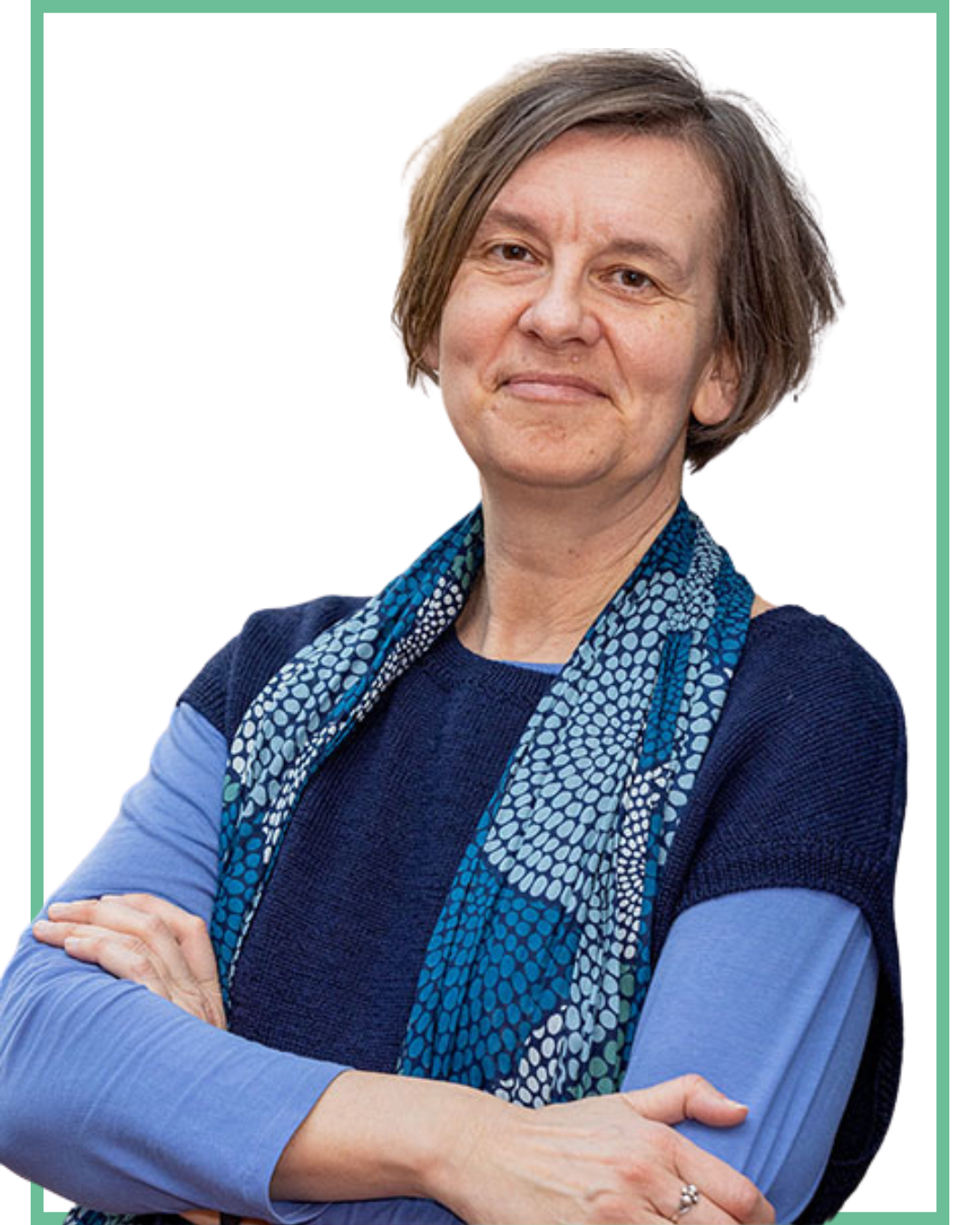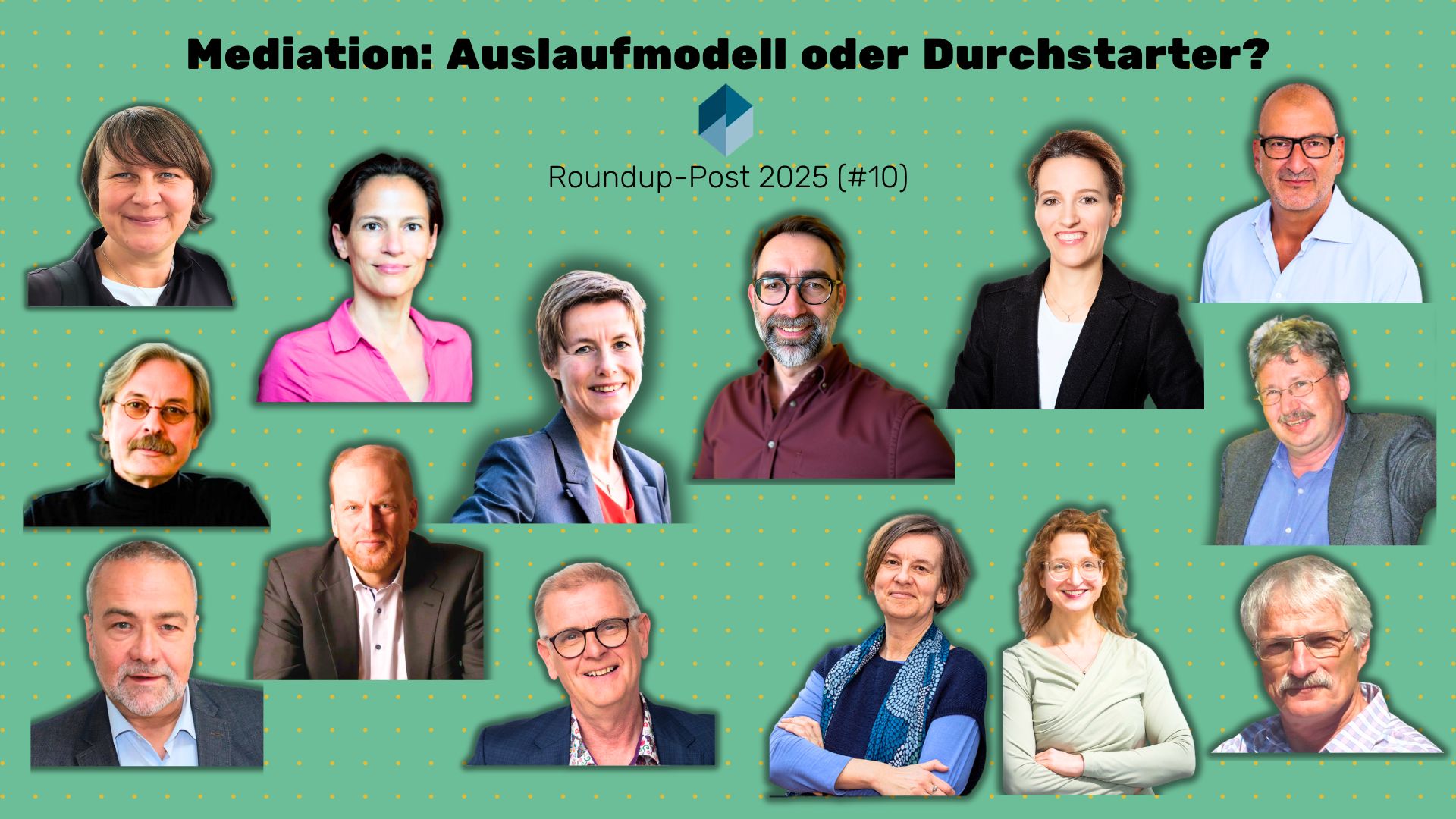Mediation in 2025 - a discontinued model or a breakthrough? On the future prospects of mediation.
INKOVEMA Roundup 2025 (#10)
In the European peacetime of the noughties and tens, when mediation was intensively promoted financially and ideologically by the EU and national governments, mediation unfortunately did not achieve the hoped-for status of a "common alternative" to the court.
Now that war has returned to (Western) Europe and state funding has waned and aggressive, power-based confrontation strategies have become socially acceptable (again), what do you think, is mediation past its prime or is it perhaps precisely because of this that it is gaining the popularity in practice that it has always hoped for and claimed?
What are the decisive reasons for you?
Read the answers from mediation experts below.
We at INKOVEMA provide for 10 years A fundamental question about mediation every year. Reason enough for us to look to the horizon and analyse the prospects for mediation. We are grateful for the submissions and, as a result of the different response tendencies decided to do so, all answers unabridged to be published.
Dear reader, we would be delighted if you would take the time to also Your prospects and also your reactionsthoughts and feelings that the present 14 respondents have triggered in you, all of us available in the comments ask.
Dr Alexander Redlich
Hamburg
Psychologist and counsellor
University of Hamburg (Retired professor)
Co-editor of KonfliktDynamik
Website: Website University of Hamburg

Mediative conflict mediation has always been important. It has good and bad times behind it - and ahead of it. This applies to all different areas of life: to large and small politics as well as in private organisations, in family and neighbourhood disputes. Bad times offer the opportunity to optimise mediation to suit the situation. To do this, you should critically reflect on your own concept and ask yourself what you have not taken sufficiently into account in recent years, in which aspects you have not reached some people, and what you should tackle in the future.
I have critically reconsidered my understanding-orientated concept of mediation with regard to its acceptability by potential conflict parties and come to various points, one of which I will focus on here; the Fundamental dilemma of relationship-promoting ("polite") communication behaviour and (risky) emotional truthfulness.
In the 80s and 90s, I had too little experience with serious conflicts in my conflict work in groups. In addition, I mainly worked as a mediator in academically educated circles. I was well received there and developed a highly differentiated, mindful language. However, I did not learn a simple, concise way of expressing myself. I was (and still am) a Relationship-promoting, appreciative language is more important than an honest portrayal of the negative emotional truth between the conflict parties and also my own current emotional state. The parties to the conflict occasionally expressed their astonishment at my "patience", which they could not muster themselves, or their ambivalent admiration for my "friendly" formulations when actively listening to them. Although I was able to "politely rephrase" their current feelings, I did not emphasise the strength of the negative feelings between them. I obviously didn't do justice to either side. The angry side felt "softened" ("I'm not 'annoyed', as you say, but I'm just boiling with anger!") and the other side felt misunderstood ("I don't just experience the other side as 'dominant'. They waste our time with endless waffle."). I also didn't show my own anger or frustration about some of the attitudes and behaviour of the conflict parties, e.g. in their frequent attempts to blame the other side, third parties or me for resolving the conflict.
I have found many mediators to be even more polite than me and now think that this socially acceptable image of mediation is seen as attractive by many conflict parties, but is also viewed critically at the same time. It is no wonder that mediation seems unrealistic to large parts of the population and often does not correspond to their conflict world of judges and rivals, victory and defeat, humiliation and hatred, or is too soft. In other words: I think that mediation has an honesty problem. The mediator stops the agitated dispute by controlling communication in a socially acceptable way in an emotionalised dispute context and thus the honest expression of the emotional truth of the situation. Mediation is based on the assumption that the different subjective perspectives of the parties involved are equally valid. Recognising different "truths" is essential for both sides to understand each other. But it collides with the conflict parties' - ambivalent - need for truthfulness in mediation. I have often sensed that this socially acceptable image of mediation does, on the surface, allay the fears of many conflict parties that it will lead to heated disputes. Underneath, however, it is experienced as dishonest politeness, which hardly provides a viable basis for realistic conflict resolution. I see this as a dilemma that I have long avoided at the expense of truthfulness.
20 years ago, I learnt how to work with my US-American colleague Jay Rohmanto ask the parties to the conflict to first try to resolve their points of conflict themselves in our presence for about half an hour. We would only intervene beforehand if they asked us to do so. By observing a longer interaction process, we were able to recognise their (different) emotional states and their dynamics in a more differentiated way and then name them more clearly than with the "short leash of active listening", which was and still is the order of the day in this step of the mediation process.
To reduce my tendency to use the expression own of negative feelings, the Behaviour of the former Finnish Prime Minister and Nobel Peace Prize winner Martti Ahtisaari in his political mediations. His conflict parties and co-mediators report that he was able to directly express his feelings of anger and impatience about the behaviour of the conflict parties in an unpleasant way (Ford, P.D. (2006). Got conflict? Mr Ahtisaari is your man. Christian Sci. Monitor (May 4), http://www.csmonitor.com/2006/0504/p01s04-wogi.html [21.3.2021]). This obviously did not stand in the way of the success of his political mediations. His example gave me the courage to express my own frustration or anger in an appropriate way - albeit considerably weakened. With regard to the question of how spontaneous expression of negative feelings by mediators affects relationship building and conflict resolution as well as honesty and the mutual trust that builds on it, the (thin) research situation is contradictory (Zhang, T., Gino, F., Norton, M.I. (2017). The Surprising Effectiveness of Hostile Mediators. Management Science (63, 6):1972-1992. https://doi.org/10.1287/mnsc.2016.2431 [25.9.2025]).
The recommendation of the theme-centred interactional method according to Ruth Cohn (Cohn, R. (1975). From psychoanalysis to theme-centred interaction. Stuttgart: Klett-Cotta.) to communicate selectively and authentically still seems to me to be a fruitful approach to the further development of mediation. It is clear to me that this does not sufficiently mitigate the dilemma. Mediation research would have to address it extensively, e.g. with regard to the fit with the (sub)cultures of the conflict parties. Because it also depends on which parties you are dealing with. A very mindful mediation style is likely to have a significantly different effect when dealing with conflicts in a church council than on the board of a rugby club. The conflicting communication styles of large population groups, which are currently causing problems for democratic societies, seem to me to have similar problems and, in my opinion, require separate consideration.
So: A mediator's communication style that is always friendly and emotionally controlled is not very authentic and is likely to limit the willingness to mediate. Addressing this dilemma seems to me to be a requirement for the further development of mediation. It could help mediation to correspond more and more to the reality of the diversity of human conflicts and thus promote its more frequent use.

Mediation is not past its prime - it may not even have reached its actual time yet. The past decades of the European peace dividend have shown that mere state support is not enough to make mediation a matter of course. Mediation is not a product that can be "introduced" like a technical solution. It is a cultural approach to dealing with conflicts that requires an attitude of understanding.
Especially when political rhetoric becomes power- and confrontation-orientated again, there is a growing need for processes that keep the space for understanding open. Mediation is therefore not a delicate peace utopia relic, but a treasure that must be found all the more in times of increased polarisation. Its value does not lie in the label "alternative to court", but in addressing the actual need - sustainable understanding - without predetermining the solution.
The vision of a conflict culture characterised by mediation therefore remains as relevant as ever. What is needed are not only support programmes, but also people who live this attitude, make it visible and communicate the benefits - not the process. Where social tensions are growing, mediation can unfold its special power: not despite, but precisely because of the increasingly loud voices of confrontation. The opportunity of mediation lies in the fact that it can show the way to reason where reason itself is unable to do so. See https://wiki-to-yes.org/article1310-Die-Stille-der-Vernunft

There are several reasons why mediation is still a "niche product" in Europe. A lack of visibility, power asymmetries and the associated need for constitutional security and effective protection mechanisms as well as our legal culture of confrontation are just some of the factors behind this. Challenging geopolitical and economic times do not facilitate the broad acceptance of a conflict resolution approach that favours (self-)responsibility, fairness and building bridges. However, it would be wrong to "write off" mediation because of this. This is because it can be a constructive alternative to escalation and provocation, especially in power-laden constellations, and can help to bring social cohesion and the need for cooperation back into focus. After all, any solution is ultimately worth nothing if humanity and the endeavour to act sustainably have been lost along the way.
Greg Bond
Berlin
Mediator,
Lecturer in mediation and communication
at the Technical University of Applied Sciences Wildau,
Trainer
Website: www.bond-bond.de

It is true that the optimism of the years following the end of the Cold War is over. A great sense of disillusionment is setting in. We will probably face even more difficult times if the political situation in Europe continues to shift as we have seen in recent years. The antagonism has increased, in global politics as well as in municipalities and communities. Common solutions are not being sought. Power prevails. Urgent problems are difficult or impossible to tackle in this way - climate change is not waiting for humanity to realise it.
I do not share the high expectations of mediation that resonate in the question posed in the roundup. Nor do I believe that the efforts of recent years to establish mediation have been in vain.
1. mediation is not the salutary solution to conflicts that some people seem to think it is. It is one way among many to tackle problems together. Let's put aside the missionary and messianic. Let's offer pragmatic procedures.
2. mediators have no more and no less social and political responsibility than other professions. If you are concerned about the political situation in the world, then become politically active. Do not expect mediation to have a social impact that is located elsewhere.
3. mediators know that they are operating in a provider market. Complaining that mediation is not popular is wrong in my opinion. We need to work on making it better known and we need to make the product attractive. Mediation may have a quality problem. Political framework conditions help. Mediation marketing is important. Ultimately, the users (consumers) decide whether it is a good thing. If they do, then the market will grow.
4 Peace mediation is an important field. Most mediators do not work in peace mediation. Mediators do not create peace (except in their own conflicts). Peace is created by the parties to the dispute. We offer support and procedures, in the vast majority of cases in everyday disputes - in companies and organisations, in families, as arbitrators. Let's make sure that these procedures are good.
Dr Isabell Lütkehaus
Berlin
Mediator (QVM, BM, BAFM)
Supervisor & Executive Coach (DGSv)
Lawyer & author
Website: www.luetkehaus.berlin

I see mediation as a way of resolving conflicts independently of global political trends and international strategies.
Just as appreciative and respectful interaction between people, groups and organisations in general will always have its own space and special justification. At the same time, I have the impression that - perhaps in contrast to political tendencies - a particularly pronounced mindfulness can be observed in the individual. This may also become more visible again in the political sphere with a time delay in the sense of a pendulum movement. Perhaps mediation is not and will not become the "usual alternative" for all types of conflict, but I am certain that it will retain and further expand its relevance as a sustainable solution in organisational and economic contexts as well as in private life and not just in certain educational circles, because the advantages of individual approaches are obvious.
Dr Katharina Kriegel-Schmidt
Hamburg
Professor of Social Work & Social Pedagogy,
Management team of the nationwide mediation research group
Website: https://forschungsgruppe-mediation.weebly.com/
https://www.kriegel-schmidt.com/

Two short answers to the two questions framed by theses:
1 Yes, mediation is becoming more popular, despite populism and war.
2 Yes, mediation has perhaps seen its best days.
But what is encouragement? How do we want to measure the success of mediation (or counselling, therapy, coaching, ... - all of which strengthen the individual and their relationships and promote self-reflection and articulation) in society as a whole?
Re 1.) My students are already familiar with popular communication techniques such as active listening, I-messages, NVC, etc. before their studies, schools train conflict mediators, companies refer to mediation services. Nobody seriously stumbles across the word mediation any more. Younger people are familiar with the idea of resolving conflicts without violence. This is at least an ideal, which was not the case in the past. And there is already expertise in this area. Cultural sociology shows that people today seem to have internalised exactly what mediation wants to help bring about in conflict: not the orientation towards the normal, the norm, the other, but towards the special, the uniqueness, the intrinsic value, the distinctiveness, the creative, self-responsible shaping of life. In Reckwitz's words, mediation fits into the social logic of singularisation.
Re 2.) There is not enough demand for training or programmes. There is (still) no specialised discourse, few references to each other, hardly any empirical mediation research. There is a mediation profession whose members - if they were categorised in the SINUS milieus - could perhaps only be located in three milieus. Mediation can (also) be instrumentalised. If you follow Bröckling, it can tie up energy where protest and rebellion would be more effective (and more important). There is a shortage and there are problems. - Perhaps there is not much more to come professionally.
I would therefore conclude that we should leave fantasies of success in the 00s and 10s. I think it makes more sense to recognise that the actions, thoughts and wishes associated with mediation were part of a powerful cultural development and will perhaps continue to be for some time to come.
Kirsten Schroeter
Hamburg
Mediator & Trainer BM®,
Academic Director of the Master's programme
Mediation and conflict management at the
European University Viadrina
Co-Editor Conflict Dynamics
Website: www.mediation-altona.de

In the face of war, the inevitable destruction of lives and living environments and the associated suffering, the question of its effects on the field of conflict resolution is certainly not the first one I have asked myself.
However, if I do get involved, I prefer to adopt a more optimistic perspective - on various levels.
As far as the concrete emergence of mediation cases on a very personal level is concerned, I find this rather easy. There is no shortage of case enquiries. For many years, I have received far more enquiries than I could handle - which is not the only reason why I am happy to have access to a large network of competent and experienced colleagues who then take over. Even beyond the volume of cases in my own immediate area, I experience stable to increasing case numbers in the fields in which I have an in-depth insight - in conflict resolution in companies, in cultural or political organisations, in voluntary areas, in education and research, in contexts of communal living, in the field of mediation in court. In this respect, I doubt the much-used narrative of the "scarce cake" and the lack of cases. Instead of complaining about a (supposed) shortage, it seems more productive to me for us as mediators to ask ourselves self-critically what we are not yet offering sufficiently or what we are not yet succeeding at sufficiently - so that people in specific conflicts experience mediation as beneficial and relieving.As far as the international dimension addressed in the question is concerned, I find the optimistic perspective more difficult - in view of the war in Europe, but also because I am not an expert in this domain. I listen very carefully to my colleagues with specific expertise in this field. I assume that there is probably much more activity going on here than we realise. Behind the scenes, where there is usually the right place for the painstaking work of rebuilding destroyed trust and broken communication channels. With staying power, perseverance, a certain fearlessness - especially when dealing with aggressive approaches, setbacks and failure - with clear words and confidence.
In ten or twenty years' time, in retrospect, it will probably be easier to answer this question. For the time being, I prefer to remain optimistic. And to continue to assume that it is largely up to mediators to do their part to ensure that their contribution can be experienced as sufficiently meaningful - and in this respect, to constantly earn the hoped-for encouragement themselves.
Dr Martin Probst
Schleswig
Presiding Judge at the Higher Regional Court
Mediation with the arbitrator in ordinary jurisdiction, coordination
Website: http://www.schleswig-holstein.de/DE/Justiz/OLG

An important and weighty survey.What might we have hoped for? And what could we realistically hope for?Mediation has become better known in Germany (I hesitate to say really "known") and has at least become an option for our professionals. This is also the case with my arbitrators. As a result, we have a certain "base" of mediations, which is difficult to expand, especially as the "hype" of the new is already over. However, I think that good and sustainable work is most likely to be successful and that word gets around.
Thomas Robrecht
Unterföhring
Organisational consultant, trainer,
Coach and mediator
Website: https://www.sokrateam.de

There are some self-limitations of mediation with which it is increasingly manoeuvring itself offside:
First self-limitation: mediation as an alternative to litigation
This understanding reduces the possible applications enormously. There are many more applications of mediation where legal issues are secondary to irrelevant.
Second self-limitation: wanting to convince people of mediation
Those who have learnt mediation are usually inspired by a deep desire to share their positive experiences with the world. People who know nothing about mediation may experience this as proselytising and therefore reject it.
Third self-limitation: search for interests and needs
Exploring interests and needs can be very helpful for people with a strong capacity for self-reflection. If this ability is poorly developed, this path proves to be extremely rocky and arduous. The ever-increasing pull of simple answers in our society points to a decreasing and low ability to reflect.
Fourth self-limitation: The self-reference of the quality definition
The quality of mediation training should serve as a definition of mediation quality. However, there is no reliable understanding of mediation quality.
Solution approach for the removal of self-limitations: For mediation to gain a firm place in our society, it must understand and establish itself as an independent profession of conflict management.
Tilman Metzger
Lüneburg
Mediator and mediation trainer
Lawyer
Website: www.tilmanmetzger.de
www.mediationsausbildung.de

It is not unfortunate that mediation has not become a "common alternative to court" in Germany. I find the perspective of Higher Regional Court President and mediator Stefanie Otte, which she describes in the podcast with Sascha Weigel, remarkable: In a constitutional state, there needs to be a sufficient number of disputes settled in court so that there is a continuously updated public standard for what is to be considered law. We have to get used to the fact that a functioning constitutional state can no longer be taken for granted, even in Western democracies, but is a valuable asset that must be actively utilised and defended.
The strength of mediation is not that it prevents people who want to sue from taking legal action. The strength of mediation is that it helps to resolve conflicts long before they are viewed through a legal lens. Today, mediation is a normal instrument of relationship management: more and more management teams are organising an annual mediation workshop. Companies and private individuals are considering mediation earlier and earlier in the conflict process. The demands on communication have risen continuously over the past decades. As a result, it has become increasingly common to seek help from conflict professionals at an early stage.
As long as we live in a liberal democracy, justice and mediation will flourish - and vice versa.
Dr Sonja Fücker
Bielefeld
Sociologist and mediator
Website: https://ekvv.uni-bielefeld.de/pers_publ/

The world turns differently when there is fear and worry in the room. With the prospect of a tangible reality of war that can no longer only be experienced in other distant parts of the world, but on our own doorstep in Western Europe, we have to deal with the value of peace, security and defence in society as we have not done for a long time. The generally high level of support for the reintroduction of compulsory military service among the population (e.g. Ipsos, Statista) shows: Peace can no longer be taken for granted as it was in previous decades. Of course, this was not the case before Russia's attack on Ukraine, if we look at other parts of the world and the fragility of global political uncertainties. However, it was possible to ignore the idea of war because it was not on the radar of the immediate reality of life in our and other Western European societies.
In this area of tension, a process such as mediation, which is based on mutual understanding rather than power-orientated enforcement of interests, will find it difficult to gain a (greater) hearing in the future. The fact that it has not yet been able to assert itself as a "genuine" alternative to judicial dispute resolution or in armed conflicts is particularly evident in view of current developments. The question arises as to whether mediation can even be up-to-date in this climate - or whether its practice is degenerating into an anachronistic wish.
Two thoughts on this: The imposition and confidence of mediation
Mediation challenges conflict parties to go against what are often instinctive impulses - and to focus on understanding instead. This makes it per se an imposition for dealing with fears, loss of control and the need for security. The fact that only a small number of the population (16% according to the Forsa survey) can imagine fighting in the event of war, compared to the high level of approval for the reintroduction of compulsory military service, also holds out the prospect of confidence in mediation and its development. The idea of war has become frighteningly real - and at the same time, people find armed conflicts rather unimaginable in their realisation. This goes hand in hand with a high level of awareness of the value of understanding in society. Study results ("Conflict Monitor" by ConflictA - University of Bielefeld) show high approval ratings that social and political conflicts should primarily be resolved through dialogue and compromise.
In this socially mixed situation, hopes and fears are close companions of mediation:
On the one hand, the confident belief in non-violent understanding through dialogue and compromise, and on the other, the fear of losing security and control, which makes mediation an imposition, especially in these times.
In order to strengthen the sparks of hope for mediation, the often lengthy, arduous and "quiet" successes of mediation practice - achieved on the political backstage - should be made visible in their results. For example, the ceasefire agreement between North and South Korea, which lasted for decades and was negotiated in more than 500 (!) meetings. Or the peace treaty between Egypt and Israel initiated by Jimmy Carter at Camp David in the 1970s.
Sascha Weigel
Leipzig
Mediator, conflict counsellor, podcaster
Initiator of the Roundup posts
Website: www.elemente-der-mediation.de

There were reasons why modern mediation was confronted with hopes that ranged from high to exaggerated right from the start. As much as the groups promoting mediation (stakeholders) had different problems to deal with and were therefore motivated differently, they all had one thing in common: mediation seemed promising. The reason for this was the assumption that the Addressees of a mediation offer, the Conflict parties also as fans of mediation fantasised were made. However, this assumption was no evidence or data basis. With some distance, we can now say that this was a mistake. And that is why it would be a mistake to conclude that the heyday of mediation is over as a result of a certain hangover.
Whether mediation not only establishes itself in certain circles but is also widely used in society depends, in our experience so far, not so much on the parties to the conflict but on those who also have an influence on whether these conflict parties cross the threshold to mediation. In my opinion, they are the most important Advocates of and in favour of mediation: the people involved in a conflict.
As Persons involved in a conflict are those "also" affected and affected by a conflict, not the participants themselves; it is the team members in a conflict between two of their own or the supervisor in a conflict within the team as well as club mates or family members who feel the effects of the conflict, the classmates and teachers in conflicts at school, the suppliers in a workplace conflict, children and siblings(!) in separation and divorce conflicts, local residents and citizens in infrastructure projects, but also the abstract, i.e. legal persons, i.e. organisations are surrounding persons: Municipalities, companies, authorities, even courts, all those who have a high and understandable interest in ensuring that the parties to a conflict deal with their problems in a productive way instead of exclusively in conflict, in a civilised, binding and perhaps also unifying manner.
This environment experiences the conflict as a pull event for focussing its own attention, feels the social pressure from the conflict parties (to agree with one side and reject the other!) - and is itself the starting point for social (counter) pressure that addresses the conflict parties. There is a need to catch up here. For the further development of mediation as a process and method, I would therefore recommend that the direction of the goal needs to be readjusted. Offers, structural aids and ideas should focus on this in future. After all, the conflict parties are not solely responsible for productive conflict management.
Robert Erkan
Hanau
Certified and licensed mediator (BM),
systemic counsellor,
Communication trainer
Website: www.erkan-communication.de

There is no simple answer to the question of whether mediation has seen its best days or is just now gaining in importance. What is clear is that it has established itself. Whether it will become an important player in social conflict resolution remains to be seen.Particularly in light of the war in Ukraine, the escalation of the Middle East conflict and a geopolitical situation in which democracy, human rights and the basic liberal order are being called into question, the most difficult social situation in decades is becoming apparent - and at the same time its relevance is growing. Because where polarisation, fear and power logics dominate, spaces are needed in which understanding remains possible - without the risk of being instrumentalised.Many tensions are evident here: Building bridges or drawing boundaries? Maintaining impartiality or enabling clear demolitions? For me, this is not a contradiction. It means facilitating dialogue where it is viable and taking responsibility where there is a risk of instrumentalisation.This is not only about moral and ethical issues, but also about the protection of mediators. Those who accompany socially uncomfortable conflicts must be able to trust that they are armed not to be "torn apart" by the public. Confidence in our neutrality and impartiality is a public asset that we must preserve, create and constantly renew.Therefore, in addition to "person-centred" and "organisational" mediation, a third pillar is needed: social-public-political mediation. Clear guidelines, professional exchange and courageous self-assurance are necessary here. The German Mediation Association is taking important steps in this direction with the establishment of a specialist group, which I accompany and support as a board member.Conclusion:I don't see many professional trades and attitudes like us mediators who have the responsibility to take on these challenges - or even have to. A solid basic education is just as important as practical experience in the first two pillars in order to be able to responsibly shape the third.
Ute Liepold
Bruchsal
Mediator BM®,
Conflict counsellor,
Clarification assistant IfK®
Website: https://ute-liepold.de

Will mediation receive a boost from the escalations mentioned in the question (wars, tough confrontation strategies)? I hope so, and I would like to justify this hope with a simple train of thought: Do the strategies that can currently be observed generate confidence that conflicts can thus be resolved - in the sense of genuine pacification? No. On the contrary: we are seeing polarisation, escalation and increasing violence.
We also see, e.g. in the example of Israel/Palestine, that unresolved conflicts flare up again and again over decades and generations and cause suffering.
Mediation is used to find solutions that bring peace.
I have been working as a mediator in organisations for 16 years. There, decisions are made in favour of and against mediation by managers. In my experience, these decisions are always value-based: There is a manager who wants peace. In my own experience and that of others, this longing for peace is becoming stronger as a result of current world events. And from this I deduce that the ground is fertile, especially now, to talk about mediation and to advise and support managers accordingly. I will continue to make my contribution to this with great pleasure and conviction.





Leave A Comment